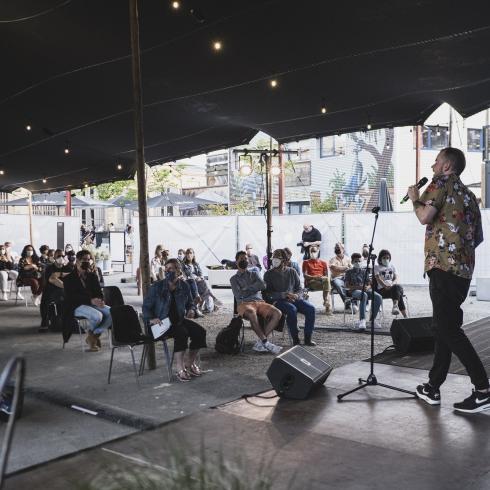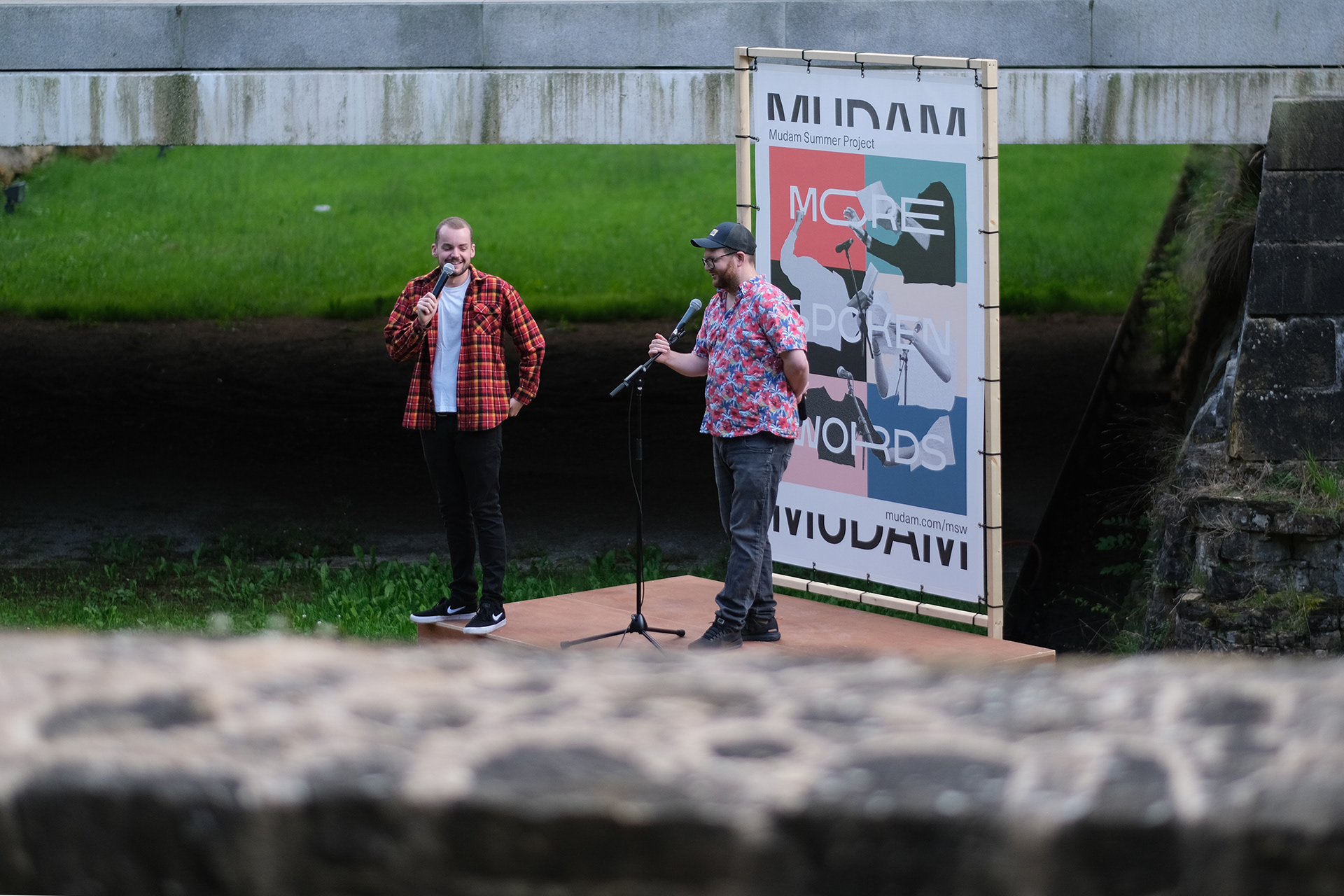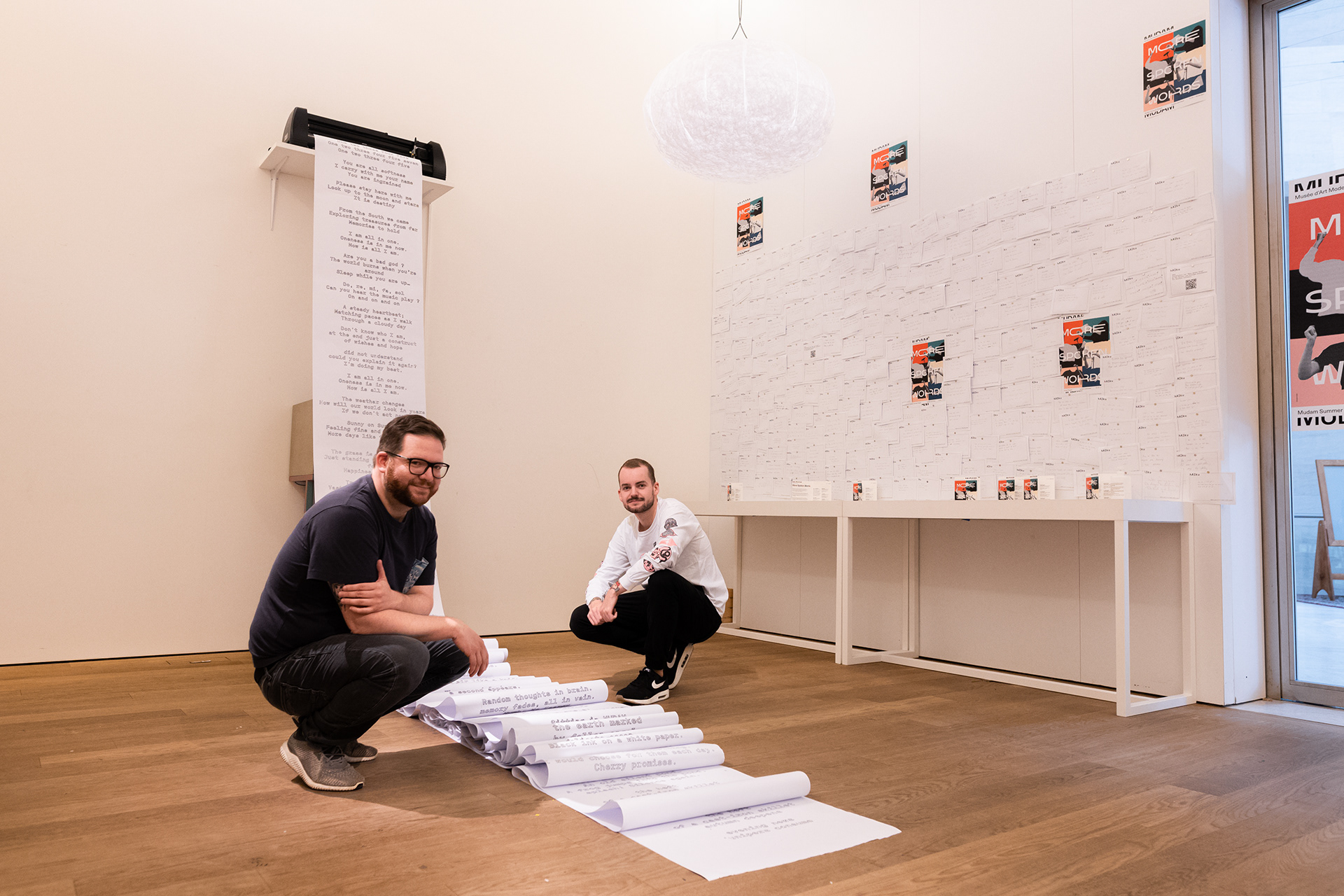16 sep. 2021Géisskan Kollektiv: Championing homegrown slam poetry

Though perhaps best known for their events at the Mudam this summer, the Géisskan Kollektiv has been working hard to grow a local scene for spoken word performance for the past six years, organising poetry slams all around the country and running workshops at schools and festivals. We sat down with one of the collective’s members, Bob Reinert, to find out more about their activities and upcoming projects.
A stage for local slammers
Reinert started by explaining why the collective was founded in the first place back in 2015: “We had all these big events where well-known artists from all over the world would get invited to perform in Luxembourg, but there’s wasn’t really a stage for younger people”. He himself joined the collective a little later, after honing his skills at slam sessions in Trier and Saarbrücken and several German championships whilst still in high school. When he discovered a stage in Luxembourg at the Kulturhaus Niederanven, he found himself competing against spoken word stars flown in from all over Europe: “We were performing alongside our idols. It was kind of demoralising when you were just starting out.”
This is when Reinert first heard about the Géisskan Kollektiv, which provided a space for like-minded local slammers to perform: “It was nice because we had a similar level and could grow together instead of always being kicked out in the first round.” It was also an opportunity to share experiences with newcomers and build a community around slam poetry. “The goal was to gradually build up a local scene and get as many spoken word events as possible”, adds Reinert, who became more involved in the collective at this point.
One of Géisskan’s first verbal boxing matches was at the buvette of a swimming pool in Schifflange, which gathered a crowd of almost 120 people, a clear sign that there was a demand for spoken word performance. Over the years, the collective continued to perform at different venues around Luxembourg, often in the south. “We don’t really have a fixed location, I kind of call it a Wanderzirkus”, adds Reinert. A turning point for Géisskan was when they joined the Poetry Slam Deluxe, an event featuring big names from the spoken word scene organised by the Institut Pierre Werner, Rotondes and Prabbeli. Whilst the collective’s slammers initially performed as a kind of warmup act before the international ones came on, the local and international artists soon started going up against each other as equals, with some victories for the Luxembourgish contingent too. After all, Reinert points out, slam poetry is a democratic scene, in the sense that the audience decides who wins the round: “Even if you’ve been doing it for ten years you can lose to a newcomer in the first round – that’s the danger but also the thrill of it.”

©Mudam Luxembourg - Musée d'Art Moderne Grand-Duc Jean
Bigger stages, bigger audiences
This moment also marked a shift from more low-key, DIY events to professional affairs at bigger venues: “It’s definitely a different ballgame when you’re performing for 200 people at Rotondes instead of a crowd of 50 on a makeshift stage”, observes Reinert. Most recently, the collective has been able to reach new audiences with their museum project at the Mudam, where they hosted a series of workshops and word battles over the summer. Their hip hop session, bad taste slam and powerpoint karaoke drew a diverse crowd to the museum and were followed by a dose of club culture courtesy of Lagerkultur.
In addition to the event series, Géisskan also staged an exhibition at the Mudam. hA.I.ku, as the name suggests, is an experiment in machine learning and poetry, where a JavaScript programme was trained to produce Japanese syllable poems by feeding it haikus by well-known artists and the collective’s own work. The final installation on display periodically printed poems by amateurs, professionals and the AI itself on an endless scroll of paper. The museum visitors were asked to figure out which was which and could add their own haikus too. With its wave-like forms cascading down from a plotter, the work is also a nod to Su-Mei Tse’s ink-filled fountain Many Spoken Words, which the title of the whole project draws on. “It was a lot of work”, says Reinert, “but we’re really happy with the result – over 450 poems were submitted by museum visitors!”

©Tammy Schuh
The first slampionship in Luxembourg
The next big event on the agenda is tomorrow’s Slampionship, where a local performer will be chosen to compete in the European Poetry Slam Championship, which is happening in Brussels this December. Instead of simply nominating someone, Géisskan and the Kulturhaus Niederanven decided to do it right and host a slam session to select a winner to represent Luxembourg. To date, ten local slammers with very different backgrounds will be taking to the stage with work ranging from comedy and satire to more lyrical performances. “We’re really looking forward to it,” says Reinert, who will be hosting the evening. There are still some spots available for anyone who wants to see first-hand which spoken word artist will go on to compete internationally this winter.
https://www.instagram.com/slampionchip_lux/
Les plus populaires
- 26 juin. 2024
- 28 juin. 2024
- 05 juil. 2024
- 04 juil. 2024
ARTICLES
Videos
26 juil. 2024TAPAGE avec Ruth Lorang
Articles
22 juil. 2024Le fabuleux destin de Raphael Tanios
Videos
19 juil. 2024

